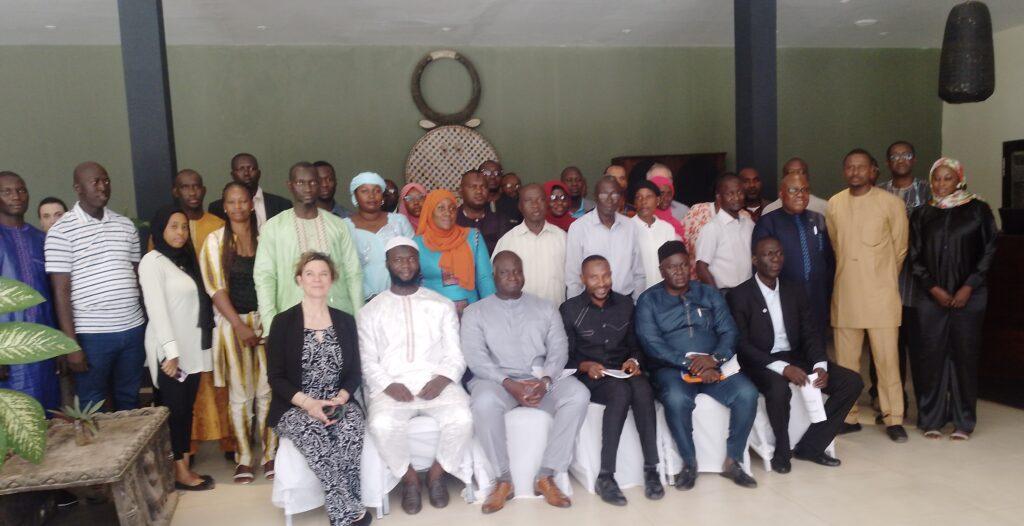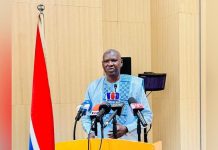Africa-Press – Gambia. The National Disaster Management Agency (NDMA) and partners held a day-long validation workshop to validate the updated National Disaster Management Policy and Strategy spanning from 2024 to 2032. This marks the first revision since its inception in 2008.
Kicking off the workshop, Mr. Sanna Dahaba, NDMA’s Executive Director, underscored the importance of revisiting the policy, emphasizing its pivotal role as a bedrock for disaster management endeavors. He highlighted its significance in bolstering environmental sustainability and fortifying community resilience against natural calamities and man-made crises alike.
Mr. Dahaba also emphasized the imperative of instituting procedural reforms to complement the revamped policy, stressing the shared responsibility for its effective execution.
“The document guides us to deliver efficient activities designed to enhance environmental sustainability by strengthening communities’ resilience to external shocks, vulnerability and exposure to natural and human-induced disasters. In a world of growing challenges, vulnerability, and shrinking budgets, we cannot afford to not stand together.
“NDMA is committed to building the resilience of our people against hazards to ensure the delivery of its strategic plan, providing relevant, timely, and high-quality support to disaster-affected families. Therefore, this policy and strategy must now be accompanied by changes in the way we conduct the business processes of our institutions. These changes hinge on all of us here,” Mr. Dahaba told the gathering.
Speaking on behalf of the Vice President of The Gambia, Mr. Ousman Ceesay, Deputy Permanent Secretary, reiterated the government’s unwavering commitment to disaster risk reduction, as evidenced by the National Development Plan 2023-2027. He pointed out the policy’s alignment with global frameworks such as the Sendai Framework and the Africa Programme of Action for Disaster Risk Reduction, aiming to fortify resilience and sustainable development efforts.
“This commitment has resulted in the improvement of risk reduction through policy and strategic focus on disaster risk preparedness, response and mitigation. The formulation of the new National Disaster Management Policy and Strategy will now be better aligned with the Sendai Framework 2015-2030, which is the global framework for disaster risk reduction, and the Africa Programme of Action for Disaster Risk Reduction.
“The overall aim of the National Disaster Management Policy and Strategy is to prevent and mitigate the risk of disasters, as well as manage any residual risk, all of which aid in enhancing resilience and ultimately achieving sustainable development. This policy and strategy prioritize individuals and highlight measures that have the potential to mitigate the likelihood of both minor and major disasters caused by natural or human-induced hazards,” DPS Ceesay told the gathering.
Furthermore, the Deputy PS highlighted the government’s substantial investment, including the $45 million WACA project, as a testament to its dedication to enhancing community resilience and disaster risk management capabilities.
“It seeks to build the necessary infrastructure around the Kotu Stream and strengthen national policies and institutions. It was against this backdrop that necessitated the funding of the formulation of these two important National Documents,” he said.
Mr. Ebrima Jawara, Permanent Secretary of the Ministry of Environment, Climate Change, and Natural Resources, hailed the policy validation as a crucial stride toward safeguarding the nation’s populace and assets. He accentuated the policy’s emphasis on sustainability, community engagement, and proactive governance, with the goal of seamlessly integrating disaster risk reduction into national planning.
“It emphasizes the importance of integrating disaster risk reduction into all aspects of national planning and development. Our strategy is clear, to reduce the vulnerability of our communities and to enhance our readiness to respond swiftly and effectively when disasters strike.
“Disaster risk management is much more than preventing and responding to disasters. It also involves the effective management of residual risks, which poses a significant challenge to the environment and our lives and livelihoods. That is why at the Ministry of Environment, Climate Change and Natural Resources, we place huge importance on this policy and strategy,” Mr. Jawara said.
Cecile Arnaud Lorillou, a Disaster Risk Management Specialist with the World Bank, provided insights into the ongoing support from the World Bank for The Gambia’s disaster management endeavors. This includes substantial investment through the WACA ResIP 2 project, aimed at bolstering coastal community resilience in West Africa.
“The World Bank has had a long-standing partnership with The Gambia providing technical and financial support to the DRM and climate change adaptation agenda, with over US$100 million in investments to build resilience across multiple projects and the WACA ResIP 2 is one such project. The WACA program supports 8 countries’ effort in West Africa to improve the management of their shared coastal resources and reduce the natural and man-made risks affecting coastal communities,” Cecilia told the gathering.
The World Bank Disaster Specialist further stated that The Gambia is vulnerable to a number of natural and man-made disasters, and the need for a robust policy to mitigate these risks.
“In 2022 alone, you experienced a once in a lifetime flooding event that affected over 50,000 people, caused 11 deaths, and caused over US$80 million in damage. We all know that climate change, extreme weather events are already are here to stay. You are here today because you want to be part of the solution for The Gambia to address these risks,” she said.
Muhammed Lamin Sanyang, Project Coordinator of WACA ResIP 2, outlined the project’s goals to enhance flood resilience, socio-economic development, and environmental quality along the Kotu Stream, from Sinchu Baliya to the Atlantic Ocean in Fajara. The project aims to improve infrastructure, reduce pollution, and enhance public health and connectivity, thereby mitigating flood risks and promoting urban development.
“The project will: strengthen the resilience to flood risks; improve the attractiveness and accessibility of the riverfront: recreational purposes, biodiversity; enhance socio-economic development of the area; improve liveability and urban environment; reduce pollution from uncontrolled storm water run-off; improve public health conditions; and improve accessibility/connectivity, avoiding traffic disruption,” Mr. Sanyang said.
For More News And Analysis About Gambia Follow Africa-Press






